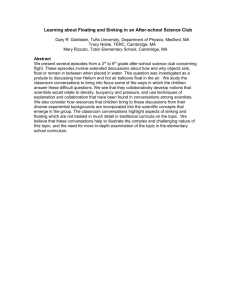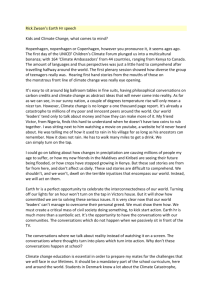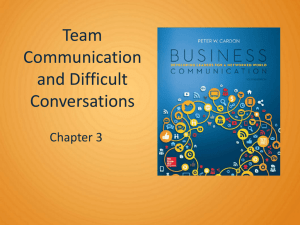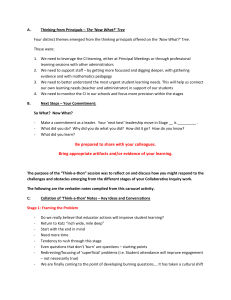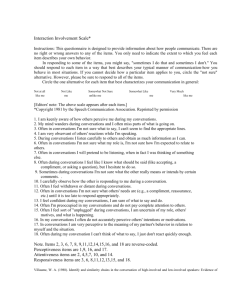That`s a Good Question!!
advertisement
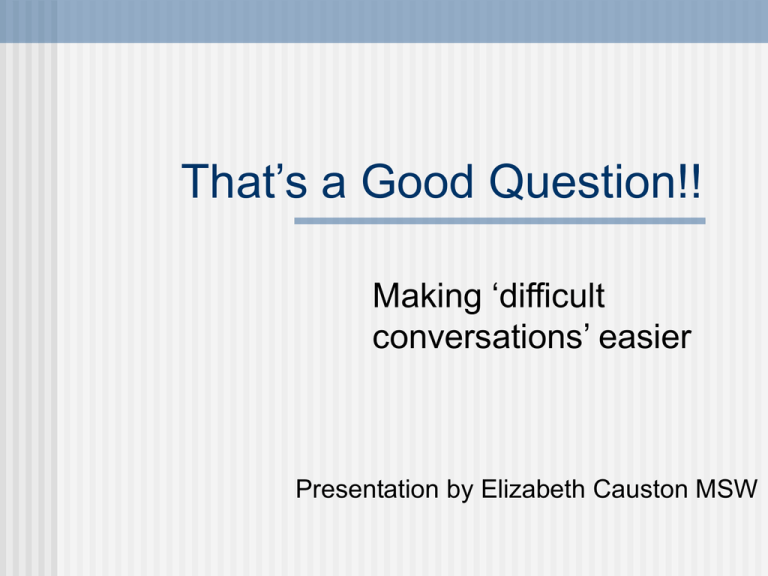
That’s a Good Question!! Making ‘difficult conversations’ easier Presentation by Elizabeth Causton MSW Three characteristics that (almost) all ‘difficult conversations’ share and two common responses by healthcare workers There is emotional content The ‘news’ is unexpected The ‘news’ is hard to hear (may even be unacceptable) Common responses are ‘avoidance’ and ‘passing the buck’ However, when having difficult conversations is accepted as a natural and inevitable part of our work,then we can begin to explore our role in making them easier, both for ourselves and for the patients and families we work with The ‘foreign land’ that is healthcare Inherent hierarchy compounded by hero /victim medical model Continuous process of separation Problem-focused / solution based orientation compounded by fear of failure Technical jargon compounded by ‘secret’ handwriting (?) A lack of consistency and clarity Creates anxiety and confusion, often expressed as anger Can destroy trust in the entire team Often results in families being unfairly labelled as ‘difficult’ Unrealistic expectations and faulty beliefs, such as…. “In family meetings everyone hears (or should hear) the same thing and you should only have to say it once” “Success is achieved when you are delivering bad news when no one cries and there are no questions” “Giving bad news is like admitting failure and should be avoided for as long as possible” More of those faulty beliefs and expectations… “Patients need to hear the whole truth whether they are ready for it or not” “Patients need to be given information in small doses because they can’t handle knowing everything at once” “It is better to say something you’re not sure of than to say, ‘I don’t know’” Lack of planning Usually caused by avoiding ‘difficult’ conversations / topics until there is no escape ‘Unexpected news’ is often NOT unexpected to the healthcare team How do these 4 factors prevent patients and families from participating in ‘difficult conversations’ in an effective way? they may feel fragmented, uncertain, fearful, and stressed… and therefore find it difficult to focus in order to understand and integrate new information they may be wary of who to trust and therefore quick to question or challenge difficult information… or they may be silenced by a fear of being judged for asking a ‘stupid’ or improper question and so fail to clarify what they think they are hearing Plan ahead, plan ahead, plan ahead Anticipate changes that are likely to happen and/or that are common in the dying process Talking about difficult topics before there’s a crisis is the single most effective way to make ‘difficult’ conversations easier Give ongoing, accurate information with compassion Be prepared to answer difficult questions…they are inevitable! What do I need to ask and what do I need to understand? “How do you like to receive information?” (in this context?) “What do you hope for?” “What do you fear?” “What is most important to you right now?” “What changes have you seen in your loved one’s condition in the last week or so?” “What you think they mean?” “I know you’ve said that you don’t want to talk about death and dying at this point in your wife’s illness, but are there any circumstances under which you would want to have a conversation about that?” “Is there anything that you would be doing differently right now if you knew that your wife’s condition was changing faster than you had perhaps hoped it would?” Be prepared for emotional content…it’s normal Choose a private place and give people time and permission to express their emotions Use language that is clear without being blunt and compassionate without being vague; then ask, “what is your understanding of what I just said?” Consider taking a colleague with you to get support for yourself,so that you can be more supportive to the patient / family Be consistent as a team Before you talk to families, talk to each other! Chart and read what is charted about the patient and family’s hopes, expectations, fears, previous experience with the system,as well what they have already been told Consider developing a Question Prompt Sheet (QPS) Read “What questions do family caregivers want to discuss with healthcare providers in order to prepare for the death of a loved one?” Hebert, R. Journal of Palliative Medicine 11(3) 2008. Such a list gives patients and families permission to ask questions about sensitive topics taking into account their specific needs for information; their sense of timing; and their preferred style of receiving information while helping them anticipate upcoming changes Know thyself Without ongoing self-reflection, difficult conversations too often become about us. Then we communicate to protect ourselves from pain. We share information the way that we would want to receive it. We avoid or discount emotions that we don’t accept in ourselves. And we may further complicate the situation by not sharing the burdens and responsibilities of our work with colleagues because of our own discomfort with receiving support.
